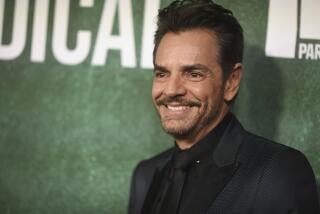Ever Banega and Antonio Cassano are rehabilitated rebels
- Share via
Where are the rebels? Where are the carousers? Where are the players who defy authority and convention and blaze their own incandescent way across the soccer firmament?
Not in the U.S., that’s for sure.
The rest of the world, however, has them in rather more abundance than it would like, but even the worst of the troublemakers eventually turns a corner.
Argentina and Italy offer two good examples.
In the case of the Albiceleste, it is 22-year-old midfielder Ever Banega. In the case of the Azzurri, it is 28-year-old forward Antonio Cassano.
They are two of a kind, players who have been so undisciplined, so insubordinate, so outrageous in their behavior that they have been the despair of their clubs and their coaches.
Now, strangely enough, they are the toast of their respective countries.
A little background is in order.
Cassano comes first because he is the oldest and, in a manner of speaking, provided exactly the wrong sort of role model for Banega to follow.
He emerged from the crime-ridden slums of Bari — born on the day after Italy won the 1982 World Cup in Spain — and was snapped up by AS Roma at age 19 for $38 million. Four tumultuous seasons in the Italian capital were followed by a couple of equally chaotic ones with Real Madrid before Cassano returned to Italy and joined his current club, Sampdoria.
Why chaotic? Why tumultuous? Why trouble-filled? An excerpt or two from Cassano’s 2008 biography might explain:
“I spent the first 17 years of my life poor. Then I spent nine years living the life of a millionaire. That means I need another eight years living the way I do now to be even.”
And:
“I know I haven’t given 100% physically or mentally to this game. At best I gave 50%, maybe a tiny bit more in the good years. But so what? Thanks to my talent, I live like a king, I play football and I have a great time.”
He boasted of his sexual conquests — “let’s say 600, 700 women” — of sneaking women into Real Madrid’s team hotel before matches and of a similar fondness for pastry that caused weight problems and brought fines.
Then there were the furious, rage-filled clashes with coaches, most notably with Fabio Capello, who once chased him across the training field yelling at him not to be a coward, and Marcelo Lippi, who controversially ignored Cassano for two years and left him off Italy’s 2010 World Cup team.
“I don’t know what I have done to Lippi,” Cassano said at the time. “Maybe he doesn’t like my personality.”
Lippi is gone and the Azzurri are coached by Cesare Prandelli, who immediately recalled Cassano to the national team. He has responded by scoring in each of Italy’s two qualifiers for the 2012 European Championship.
“Cassano feels part of the squad now and that could make a big difference for us,” Prandelli said last week. “I’ve found a more mature Cassano. His marriage has calmed him down but he’s [also] developed as a player. . . . He talks about tactical situations, something he didn’t do in the past.”
Banega, also from a desperately impoverished background, was born in Rosario, Argentina, and has followed a similar trajectory, rising from obscurity to achieve fame, fortune and notoriety.
Gifted, like Cassano, he won the Copa Libertadores with Boca Juniors and helped Argentina win the FIFA Under-20 World Cup in Canada in 2007 and the gold medal at the Olympic Games in Beijing in 2008.
His $23-million move from Boca Juniors to Valencia in Spain was almost comical in its aftermath. Within days of his arrival a video appeared on the Internet showing a naked Banega “defiling himself for strangers” on his webcam, according to Valencia officials. It was old footage from the teenager’s Boca days but it embarrassed Valencia nonetheless.
No sooner had that furor died down than Banega was arrested at 3:30 one morning for driving while intoxicated.
Valencia loaned him to Atletico Madrid, where red cards, late-night partying and disciplinary fines added to his bad-boy reputation. Valencia tried to get rid of him but found no takers.
Last season, things turned around. “I arrived at 19 and made mistakes,” Banega said. “I wasted two years and have thought about things. Now I hardly ever go out.” Banega became one of the Spanish team’s standouts.
“Banega is the most important player in the squad,” said a club official. “He dictates the pace of the game, he gives assists, he organizes the play from deep, he runs the game.”
The only one who wasn’t impressed was Diego Maradona, who left Banega off Argentina’s 2010 World Cup roster.
When Maradona was shown the door, Sergio Batista took over as Argentina’s coach. Having coached the gold-medal Olympic team, Batista knew what Banega could bring and brought him back into the national team fold.
Last week, Argentina rolled over world champion Spain, 4-1, with Banega playing a key role.
Rebellion, it seems, can carry a player only so far.
grahame.jones@latimes.com
More to Read
Go beyond the scoreboard
Get the latest on L.A.'s teams in the daily Sports Report newsletter.
You may occasionally receive promotional content from the Los Angeles Times.






